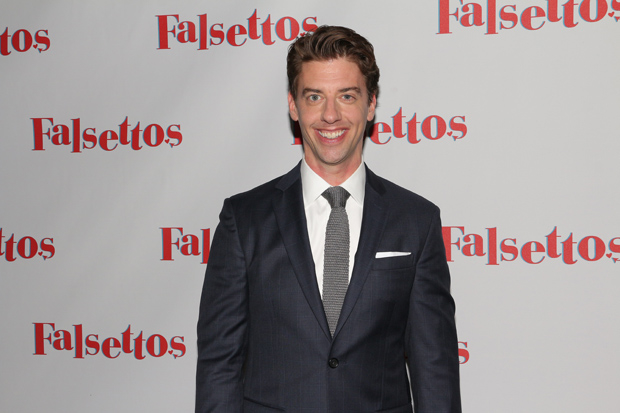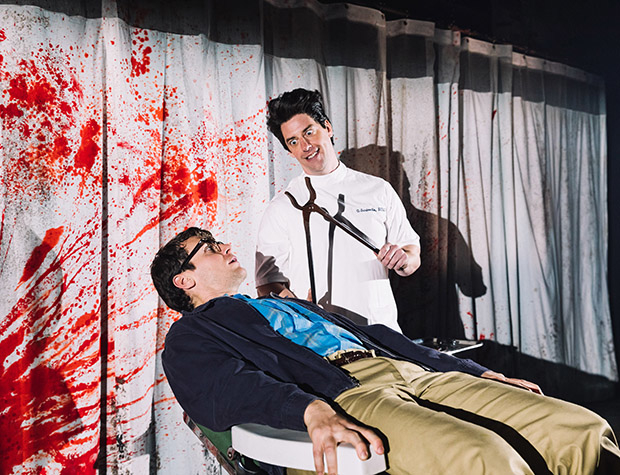Christian Borle Is Happy to Be Playing a Villain (Again) in Little Shop of Horrors
From Willy Wonka to Orin Scrivello, Borle enjoys indulging his devilish side onstage.
Christian Borle always thought he would play Seymour in Little Shop of Horrors. As a self-described "young, nerdy character actor" wearing out the show's album on cassette tape, Borle imagined himself as the love-struck flower-shop employee at the center of Howard Ashman and Alan Menken's 1982 horror musical about a flesh-eating plant.
But instead of playing just one character, Borle is now tackling eight (10 if you include voiceover parts) in the off-Broadway revival of Little Shop, which costars Jonathan Groff as Seymour and Tammy Blanchard as Audrey and plays at the Westside Theatre through January 19, 2020.
"It's just like getting shot out of a canon," Borle says of the show. "I don't stop moving for the whole night. It just goes by in a flash of costume changes and mustaches and wigs and stage dirt. It's such a labor of love, but it's not labor at all."

(© David Gordon)
This interview has been condensed and edited for clarity.
There's a lot of talk about nostalgia with this revival. The musical premiered off-Broadway in 1982, and this production almost feels like a homage to that original. Did you go back to earlier productions when you were preparing for the show?
I think we all agreed that we didn't want to reinvent the wheel, and because it's so well-written and constructed, it was easy to do. We found a new appreciation for the work that Howard Ashman and Alan Menken did back in the early '80s and really how they pioneered this new wave of musical theater. Because when they went on to do Little Mermaid and Beauty and the Beast and Aladdin, they brought true musical-theater structure to the masses in that Disney renaissance. And this is kind of like the germ of it.
The main character you play is the maniacal dentist, Orin Scrivello. Did you have any inspirations for this part or any of the other parts you play?
I really didn't. I knew Christopher Guest played the customer at the beginning, and I remember little moments of Steve Martin [in the film] but I didn't want to watch it just in case I either wanted to ignore choices that they made or repeat choices that they made. In terms of the dentist, I was heartened when I read the script that in this day and age that we're living in, they didn't try to make his abusive nature funny in any way. It's just awful. He's awful. I set out just to play it straight in that way. When he's having his little nitrous oxide fits, there's a certain maniacal comedy to that, but the rest of it is just playing this douchey, awful man, who gets his comeuppance, thank god. I just put on my best douche voice and went from there.

(© Emilio Madrid-Kuser)
As an actor, do you feel you need to find some empathy with that character?
No, I don't feel the need to empathize with him at all. He's a sadist and he says it right out of the gate.
His death scene is one of the more disturbing episodes in the show. What was it like creating that moment?
The biggest challenge was trying to get this mask right because it's traditionally done with a fish bowl over the actor's head. We knew we didn't want to do that. We had issues with whether or not this thing was going to fog up and how was I actually going to be able to breathe. We finally settled on this idea that we would have this distortion field to kind of distort my already cartoonish face — let's not kid ourselves. Once we settled on that, it really just became an exercise in surviving because it's very hard to breathe and see in that mask. It drives me crazy every night for a few minutes. When I cackle like I'm on nitrous oxide, that kind of does it all for me.
So it actually is hard to see and breathe while you're in there?
Oh yeah. That is how I earn my paycheck. The rest of it is dessert, but that little three-minute ballet is not fun as we say.
In recent years, you've played a lot of egotistical, villainous characters from Black Stache in Peter and the Starcatcher to Shakespeare in Something Rotten! to Willy Wonka in Charlie and the Chocolate Factory. What do you love about playing this archetype?
It's such a cliché to say that it's fun to play the villain. It just is. And I try to not read too much into the fact that I have and will again play these pathetic narcissists. I don't know. I really try to live a pretty decent life — a self-aware, humble life. But I keep coming back to these nincompoops with these egos. I don't know what it is, but they certainly are fun. I take it as a compliment that I keep getting offered these things. It's its own challenge to be believable but also not off-putting in this type of role. They have to have a certain likability and charm. I tend not to overthink these things. I just make big choices until they tell me to stop.
What is it like playing a character like Orin Scrivello, who abuses his girlfriend Audrey, in 2019? Do you feel like the story is received differently than it might have been in the early '80s?
I think they're relieved that we're not playing it for laughs, that we're just barreling through it. I was talking to my pal Jenn Colella after the show when she came to see it, and I think one of the only things that makes this kind of a museum piece is that it's from an era that we're all getting really tired of, where women have to be put in peril for the story to move forward. Jenn had the reaction of, "Oh right, and this is when the woman gets abused and needs to be saved by a decent guy." Wouldn't it be nice to move into a new era of storytelling where we don't have to go through that for it to be an interesting story? We can have a different kind of emotional peril. We're all getting a little tired of it, which I think is appropriate. But that being said, that doesn't mean to me that these stories should be dismissed or no longer told. We just have to talk about it.








